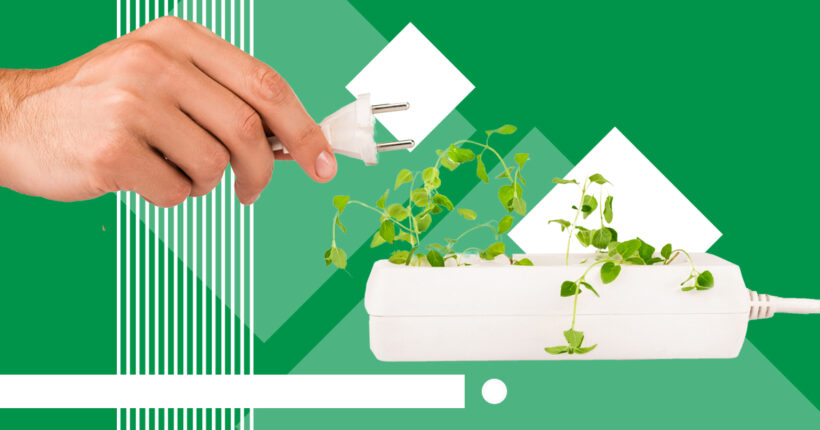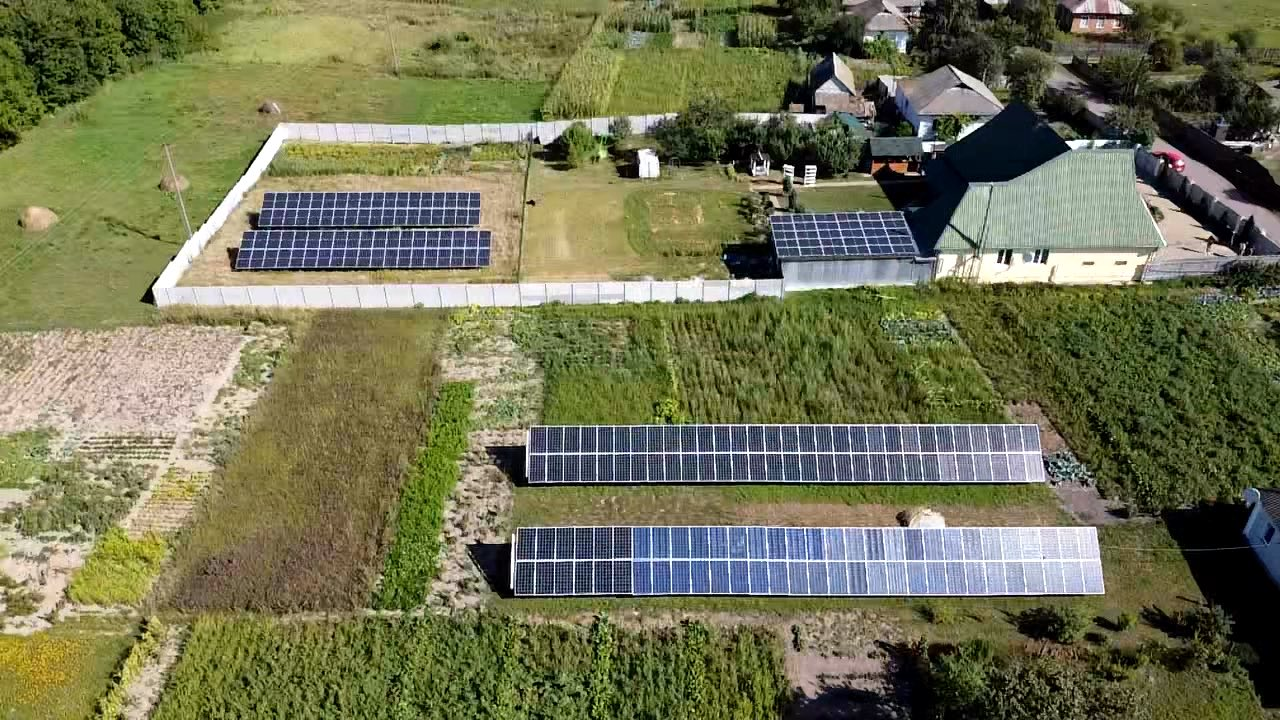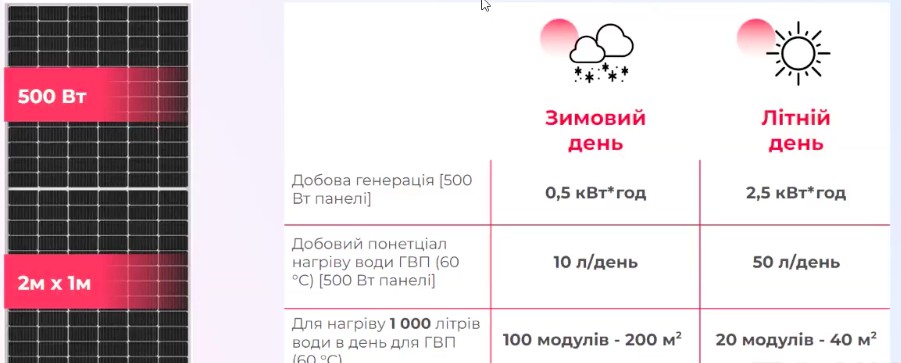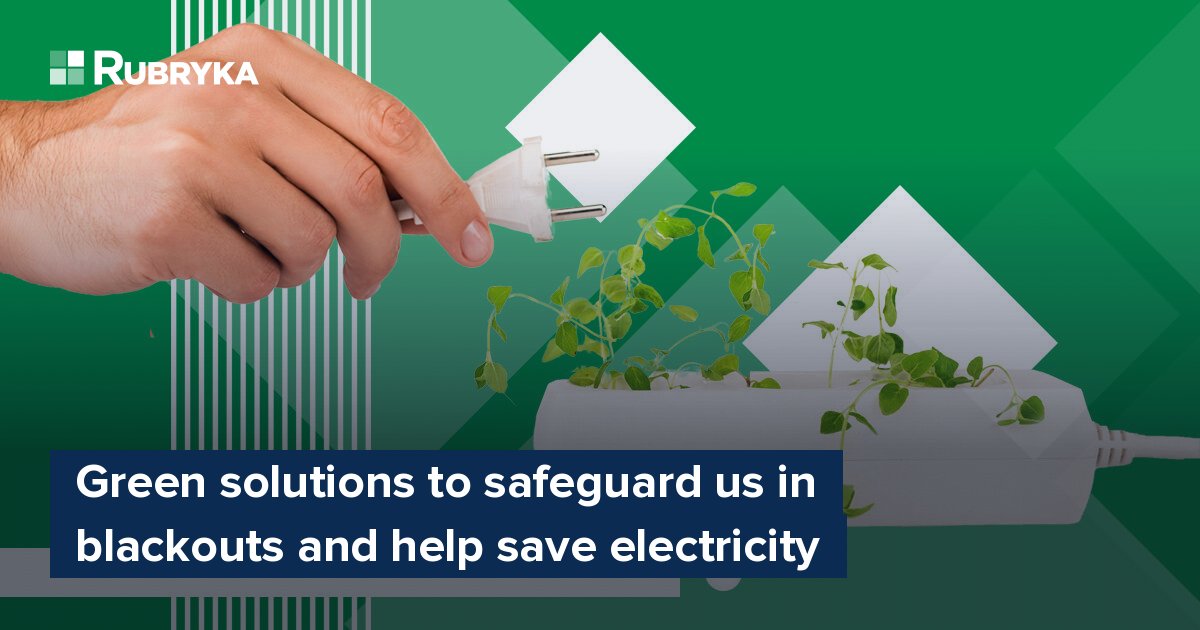
What is the problem?
The russians are attacking Ukraine's energy infrastructure and want to leave us without heat and light in the cold and dark winter season. Rotating outages to stabilize the power system have already begun. Those with electric heating have felt what it's like.
Fortunately, our country is keeping up with the times. The latest technologies have already started to appear in the homes of Ukrainians. In this article, we talk about how to warm and light your home with the help of green solutions.
What is the solution?
Residents of Novyi Bilous Village, Chernihiv Region, made an SPP autonomous and provided electricity to 50 houses
The NGO Ecodia tells the story of how, at the beginning of the full-scale invasion, the central power supply disappeared in the village of Novyi Bilous in the Chernihiv region on February 26. But the town was lucky: it had the solar power plants (SPP) connected to the central electric grid nearby, and a day before russia's invasion, an electrician specialist Rustam came to the village, who knew what to do to turn network SPPs into autonomous ones.

SPPs in the village of Novyi Bilous in the Chernihiv Region were networked but became autonomous. Source
The situation was complicated. The area was attacked by planes, and there were explosions every day. But the specialist and the locals who agreed to help him worked with the stations for four days. As a result, the grid SPPs were turned into autonomous ones that provided residents with electricity around the clock and fed two bomb shelters with constant light:
- Villagers ran extension cords from the SPP to their houses to store food in refrigerators and light their homes.
- Solar power plants have proven to be very effective in supporting mobile communications. The residents could charge 120–130 mobile phones at the solar power plant at the same time.
After the de-occupation of the territory, the two stations became hybrid. That is, they worked both for the network and for personal needs. The villagers have now disconnected all the equipment connected to the SPP during the occupation. According to Rustam's calculations, if necessary, these stations can start working autonomously again and provide electricity to 20–50 houses, depending on the level of consumption.
Heliosystems for water heating help save electricity by up to 50% and can be used even at the city level
The Khmelnytskyi municipal utility company, KhmelnytskTeploKomunEnergo, uses solar systems for water heating. It is one of the largest facilities where solar systems are used in Ukraine because the utility company supplies tens of cubic meters of hot water daily.
On average, it's possible to heat up to 10 cubic meters of water per day with the facility's help. It is not the total water volume needed to provide subscribers, but thanks to the system, it is possible to reduce the use of energy resources by 10, 20, and sometimes by 50%. The energy saved depends on the amount of sunlight, which the autumn and winter months have less. In the summer, such solar systems can meet the needs almost entirely, which means that some boiler houses can be conserved for a certain period, thereby improving the air quality in the municipality.
The same system is used at other establishments: solar systems partially provide water heating in the dormitory of the Hryhorii Skovoroda Pedagogical University in Pereoaslav-Khmelnytsk and even at factories. This is how up to three cubic liters of water per day is heated at the pasta factory in Khmelnytskyi and the industrial enterprise in Bucha.
About 20 such projects were also implemented for preschool educational institutions and hospitals throughout Ukraine.
Will it work?
Myth: Solar panels don't work in winter
Truth: You will have hot water, albeit less. The task of photovoltaic modules is to save electricity
Winter does have less sunlight, but it does not mean you'll be without hot water. Using photovoltaic modules for water, which, like solar systems, work from solar radiation, you will be able to heat water, but, unfortunately, five times less than usual.

A one-by-two-meter photovoltaic module with a power of 500 W can provide you with 10 liters of hot water at 60 degrees in winter and up to 50 liters in summer. It is provided that there is no central power supply at all, so without other energy sources, this is a real solution.
When the central power supply works, you can use the modules to save the electricity used by the boiler to heat water. Or, with the help of a network inverter, use the excess electricity produced by the modules to operate the boiler.
Myth: Solar panels are very expensive.
Truth: you can install solar panels wholesale together with your community or co-up
It's difficult and expensive to install a station on renewable sources on your own, so not everyone can afford it. However, there are other ways to help renewable energy development. For example, you can install solar stations with your co-up or community, as the Sunny City co-up did in Slavutych. Rubryka wrote about this experience here.
The cooperative has become so successful that it was recently able to purchase military bonds for undistributed profits for more than 700 thousand hryvnias!
Where to get money for new equipment?
Grants are a good opportunity for Ukrainian communities that suffer from a lack of funding in the face of a full-scale war. But by making mistakes when filling out applications, communities deprive themselves of the opportunity to attract funds for implementing projects aimed at the environment and climate, and energy projects.
The Ecoclub public organization helps communities receive such grants and regularly publishes announcements about such projects on its Facebook page. You can also find instructions on completing a grant application there. Here are the main tips from the experts:
- Complete the application thoroughly.
- Search for a suitable project.
- Define the problem clearly.
- Explain your context.
- Divide the work.
- Set realistic goals.
- Make economic calculations.
- Be precise with technical descriptions.
- Identify stakeholders.
How can a co-up self-organize with no new equipment?
Even if your co-up doesn't have additional green sources of electricity, you don't need to panic. It's better to organize yourself and take the following measures to make you feel safer and more comfortable:
- Develop an action plan in case of an emergency. For example, plan organized water draining if thermal energy is gone too long. If people try to maintain the minimum permissible temperature in their apartments, the pipes in the entrances or the basement will "burst."
- Install the generator. Let's imagine the situation: your building has its boiler room or an individual heating point. Suddenly, the power supply disappeared, and everything stopped working. First, the circulation pumps transporting water through the system will turn off. If you do not have a backup source of electricity, it won't be easy to restore the heat supply.
- Develop a plan for alternating use of additional heating systems that work from an energy carrier. The residents will turn on the electric apartment heating if the central heating disappears. In this case, the building's power supply system may turn off. Agree on the switching sequence, no matter how difficult it is. If at least half of the house residents adhere to this, the power supply system will likely continue to work, and the networks will withstand the load.






